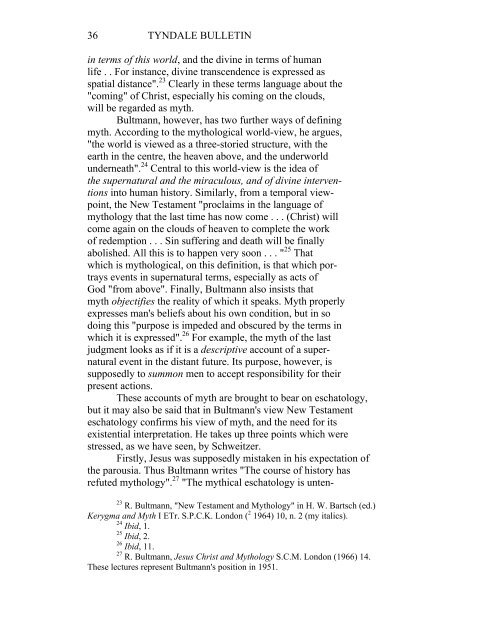the parousia in modern theology: some questions ... - Tyndale House
the parousia in modern theology: some questions ... - Tyndale House
the parousia in modern theology: some questions ... - Tyndale House
You also want an ePaper? Increase the reach of your titles
YUMPU automatically turns print PDFs into web optimized ePapers that Google loves.
36 TYNDALE BULLETIN<br />
<strong>in</strong> terms of this world, and <strong>the</strong> div<strong>in</strong>e <strong>in</strong> terms of human<br />
life . . For <strong>in</strong>stance, div<strong>in</strong>e transcendence is expressed as<br />
spatial distance". 23 Clearly <strong>in</strong> <strong>the</strong>se terms language about <strong>the</strong><br />
"com<strong>in</strong>g" of Christ, especially his com<strong>in</strong>g on <strong>the</strong> clouds,<br />
will be regarded as myth.<br />
Bultmann, however, has two fur<strong>the</strong>r ways of def<strong>in</strong><strong>in</strong>g<br />
myth. Accord<strong>in</strong>g to <strong>the</strong> mythological world-view, he argues,<br />
"<strong>the</strong> world is viewed as a three-storied structure, with <strong>the</strong><br />
earth <strong>in</strong> <strong>the</strong> centre, <strong>the</strong> heaven above, and <strong>the</strong> underworld<br />
underneath". 24 Central to this world-view is <strong>the</strong> idea of<br />
<strong>the</strong> supernatural and <strong>the</strong> miraculous, and of div<strong>in</strong>e <strong>in</strong>terven-<br />
tions <strong>in</strong>to human history. Similarly, from a temporal view-<br />
po<strong>in</strong>t, <strong>the</strong> New Testament "proclaims <strong>in</strong> <strong>the</strong> language of<br />
mythology that <strong>the</strong> last time has now come . . . (Christ) will<br />
come aga<strong>in</strong> on <strong>the</strong> clouds of heaven to complete <strong>the</strong> work<br />
of redemption . . . S<strong>in</strong> suffer<strong>in</strong>g and death will be f<strong>in</strong>ally<br />
abolished. All this is to happen very soon . . . " 25 That<br />
which is mythological, on this def<strong>in</strong>ition, is that which por-<br />
trays events <strong>in</strong> supernatural terms, especially as acts of<br />
God "from above". F<strong>in</strong>ally, Bultmann also <strong>in</strong>sists that<br />
myth objectifies <strong>the</strong> reality of which it speaks. Myth properly<br />
expresses man's beliefs about his own condition, but <strong>in</strong> so<br />
do<strong>in</strong>g this "purpose is impeded and obscured by <strong>the</strong> terms <strong>in</strong><br />
which it is expressed". 26 For example, <strong>the</strong> myth of <strong>the</strong> last<br />
judgment looks as if it is a descriptive account of a super-<br />
natural event <strong>in</strong> <strong>the</strong> distant future. Its purpose, however, is<br />
supposedly to summon men to accept responsibility for <strong>the</strong>ir<br />
present actions.<br />
These accounts of myth are brought to bear on eschatology,<br />
but it may also be said that <strong>in</strong> Bultmann's view New Testament<br />
eschatology confirms his view of myth, and <strong>the</strong> need for its<br />
existential <strong>in</strong>terpretation. He takes up three po<strong>in</strong>ts which were<br />
stressed, as we have seen, by Schweitzer.<br />
Firstly, Jesus was supposedly mistaken <strong>in</strong> his expectation of<br />
<strong>the</strong> <strong>parousia</strong>. Thus Bultmann writes "The course of history has<br />
refuted mythology". 27 "The mythical eschatology is unten-<br />
23<br />
R. Bultmann, "New Testament and Mythology" <strong>in</strong> H. W. Bartsch (ed.)<br />
Kerygma and Myth I ETr. S.P.C.K. London ( 2 1964) 10, n. 2 (my italics).<br />
24<br />
Ibid, 1.<br />
25<br />
Ibid, 2.<br />
26<br />
Ibid, 11.<br />
27<br />
R. Bultmann, Jesus Christ and Mythology S.C.M. London (1966) 14.<br />
These lectures represent Bultmann's position <strong>in</strong> 1951.

















